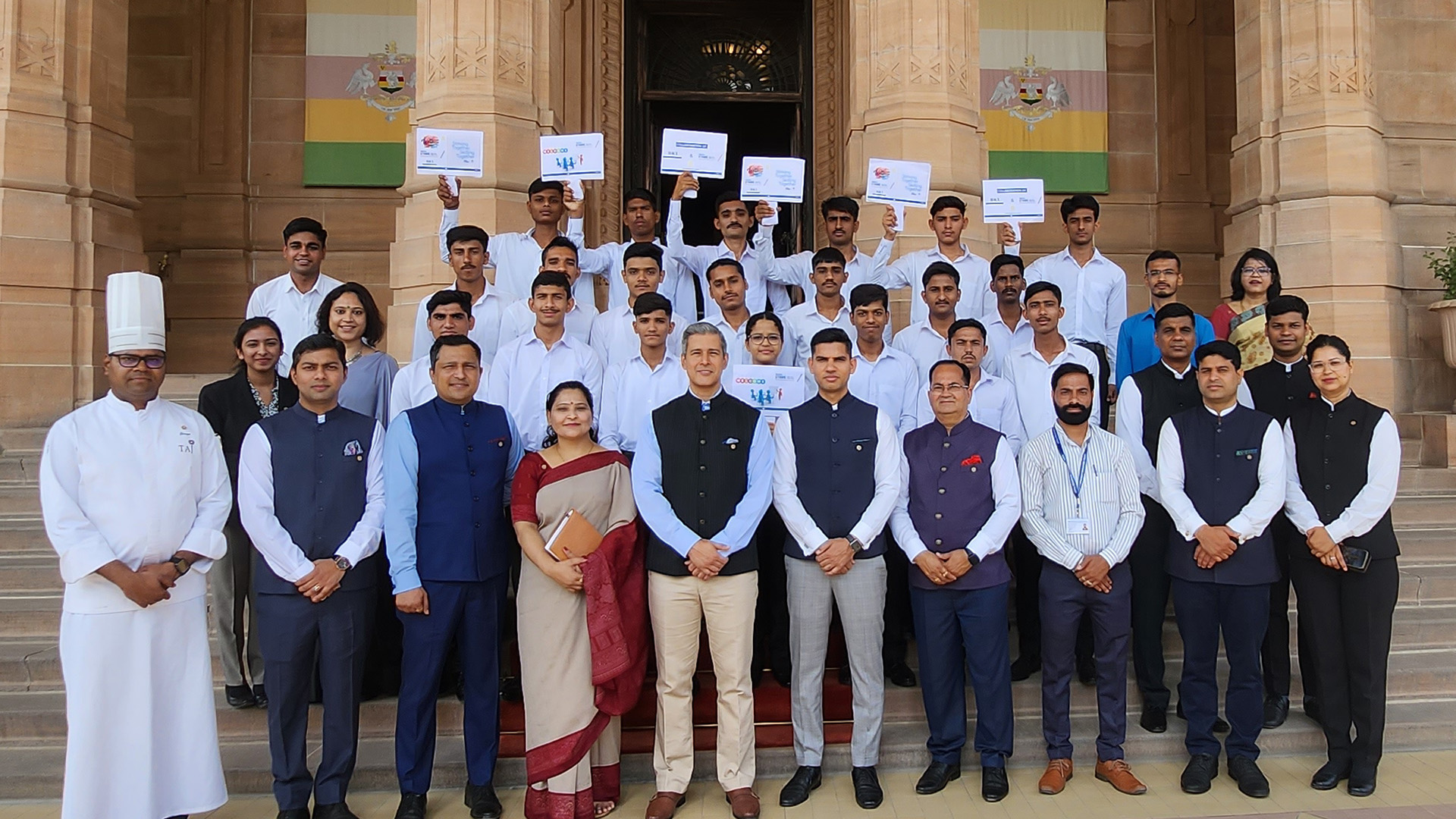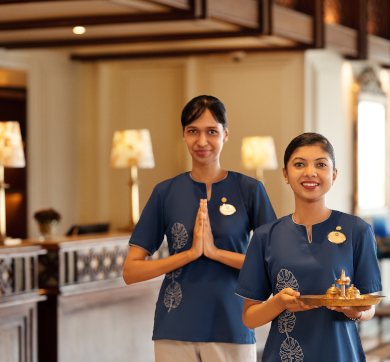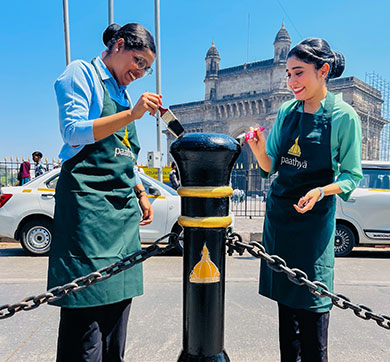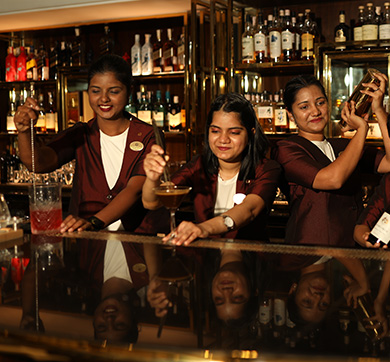June 2025 | 1298 words | 5-minute read
In a gleaming kitchen at the Taj Mahal, New Delhi, Shubham Rawat deftly wields a knife as he dices vegetables into neat, even pieces with speed. A few years ago, the young man was struggling with the challenges imposed by the 30% loss of vision in his left eye. His dreams of a career in the culinary arts seemed out of reach.
“My parents were worried about my disability and my career prospects,” he recalls. “Finding the right opportunity seemed impossible.” Today, the apprentice commis chef is among the 28,000 youth skilled by Indian Hotel Company Ltd’s (IHCL) ambitious skilling initiative that are taking their first steps towards gainful employment and industry excellence.
The challenge
Mr Rawat’s journey represents more than individual aspiration, it is part of IHCL’s sweeping initiative that aims to transform the hospitality landscape of the world’s most populace nation. As India’s travel and tourism industry strongly rebounds from pandemic lows, a shortage of skilled workers threatens to hold it back from lucrative economic opportunities. India’s travel and tourism sector is projected to reach $512 bn by 2028, from an estimated $178 bn in 2021, according to India Brand Equity Foundation, an Indian government trust.
This boom presents an opportunity. According to a 2024 Tourism and Hospitality Skill Sector Council report, the industry will require an additional ~30 lakh workers by 2028. Given that the number of formally trained youth remains low and entry level roles are hard to fill due to a lack of technical expertise and soft skills, there is an urgent need to scale up training infrastructure in the country. For IHCL, this skill gap presented an opportunity to empower economically and socially disadvantaged youth and build a talent pool for the hospitality industry — its own aggressive expansion plan of targeting 700 hotels by 2030 demands skilled professionals. Since 2020, the company, which prides itself on service excellence, has taken on the role of educator, investing in training programmes that encompass the broader industry ecosystem.

“Guided by our ESG+ framework of Paathya, IHCL’s skilling programmes are a powerful step towards bridging the employability gap in the industry and creating meaningful opportunities,” says Gaurav Pokhariyal, Executive Vice President – Human Resources, IHCL. “The programmes empower the youth to build successful careers and positively contribute to the socio-economic development of these regions.”
Betting on vocational education
In the last five years, IHCL, in collaboration with Tata STRIVE, Head Held High Foundation and other like-minded partners has expanded its network from four training centres to over 51 centres across 20 states — including the country’s largest skilling centre coming up in Goa. The skilling centres offer standardised, high-quality hospitality education and thereby enhancing employment opportunities.
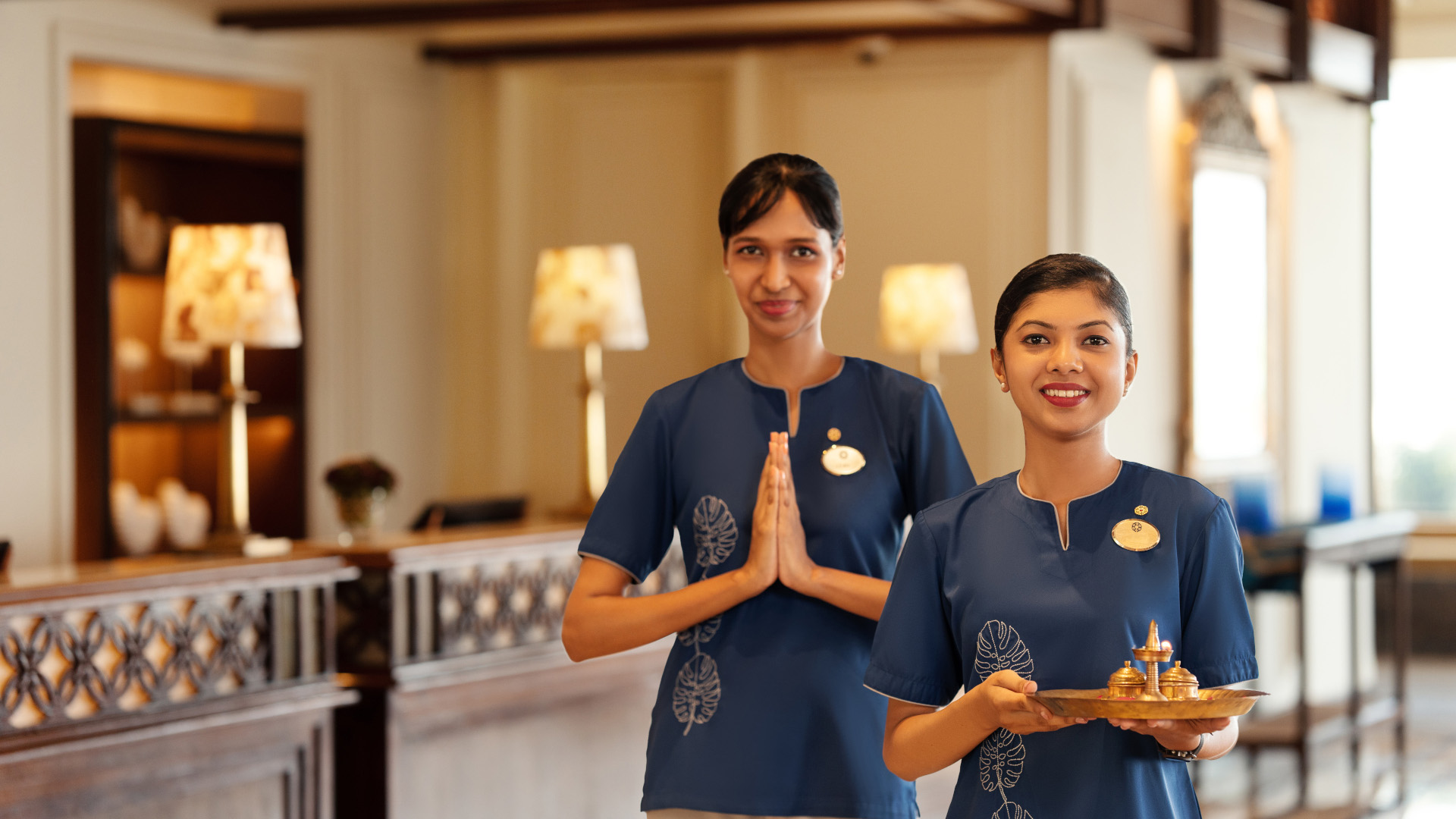
“Our partnership with IHCL is a perfect example of deep engagement between industry and a skill development organisation, which has delivered significant impact over the last 10 years,” says Ameya Vanjari, Chief Operating Officer, Tata STRIVE. “The deep involvement of IHCL experts spreads across the value chain — from designing courses, training faculty, assessing students, and providing them with on-the-job training and placement opportunities. Tata STRIVE supports the entire initiative by training other partners’ trainers, providing systems for monitoring and governance — thus bringing in consistency and truly partnering with IHCL on their mission of Paathya. The IHCL-Tata STRIVE centres are truly centres of excellence for learners to be skilled and ready for successful careers in hospitality.”
Training centres are located in towns like Chamoli in Uttarakhand, Tumkur in Karnataka, Chhindwara in Madhya Pradesh, Navi Mumbai in Maharashtra, Ponda in Goa, Kukatpally in Andhra Pradesh and Ekta Nagar in Gujarat among others. In regions like Jammu & Kashmir, IHCL has partnered with the Indian Army and REACHA (Research and Extension Association for Conservation Horticulture and Agro-forestry) to skill youth in Baramulla and Kupwara. IHCL has also collaborated with key government bodies to scale its initiatives, including the Ministry of Skill Development and Entrepreneurship, Assam Tourism Development Corporation, Confederation of Indian Industry, and the Tripura Tribal Areas Autonomous District Council.
Programme architecture
IHCL has invested in state-of-the-art infrastructure support for these skilling centres and students use Tata STRIVE’s language-agnostic Karmadisha app, to understand what role matches their interests and is best suited for them. The centres offer training in key hospitality areas such as F&B service, food production, housekeeping, front office, and spa operations. The courses are curated and deployed in partnership with IHCL’s training partners, and typically spread across four months, with in classroom sessions and practical hands-on trainings, followed by one-month on-the-job training for exposure in the industry. “The practical kitchen training was instrumental,” says Mr Rawat, who discovered his calling in food production during the programme. “Tata STRIVE equipped me with the skills and confidence to excel, and I am thrilled to learn from the best at Taj Mahal Hotel, New Delhi.”
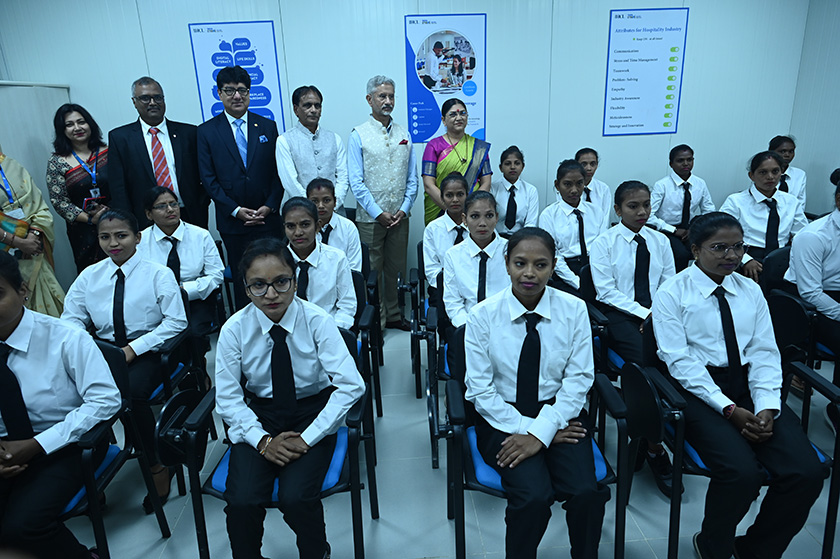
Industry-ready talent
On graduation, learners receive a certificate aligned to industry standards, increasing their employability and mobility in the industry. Since 2020, IHCL has achieved ~70% placement rate for its graduates, with many receiving pre-placement offers during the on-the-job training part of the course design. Additionally, profiles of graduating batch members are shared with the IHCL recruitment team and its national placement partners. Graduates’ needs, like choice of core department and city, accommodation support and travel safety, are an important consideration when securing placements.
“We are creating impactful programmes that empower the youth, preparing them for successful careers while addressing the growing talent needs of the hospitality industry,” says Mr Pokhariyal. “Our mission is to skill 1,00,000 individuals by 2030.”
Recognising the need to bolster each level of the skilling value chain, IHCL also conducts a Training of Trainers programme for its CSR skill partners at its hotels. Over the last couple of years, more than 100 faculty members have been trained to provide industry-relevant training and equip youth with the skills needed to thrive in the demanding hospitality sector.
Personalising learning
In the last few years, IHCL’s skill initiative has seen a substantial surge in student enrolment and now trains over 10,000 youth annually. Technology has played an important role in scaling impact. Platforms like TCS iON and DigiHub capture end-to-end data that is used to monitor the programme and make strategic decisions — over 10 years of data is mined for curriculum customisation and expansion.
IHCL and Tata STRIVE have also developed competence-based assessment frameworks that focus on skills rather than time spent in formal education. Recognition of Prior Learning (RPL) assesses a person’s skills, knowledge and experience gained through formal and informal learning, which could include on-the-job training, work experience, volunteering, life experiences, and independent study. RPL training initiatives assess various competencies and recognise skills by awarding a qualification or credits. In this manner, individuals gain recognised qualifications, enhancing their job prospects and earning potential.
Building tomorrow
IHCL’s demonstrated success in systemic, scalable interventions illustrates how prioritising long-term sustainability over short-term cost minimisation can create shared value. By working towards higher skill levels, better service standards and improved career prospects for workers, IHCL’s skilling programme is working to create an ecosystem that benefits all stakeholders.
—Kermin Bhot




